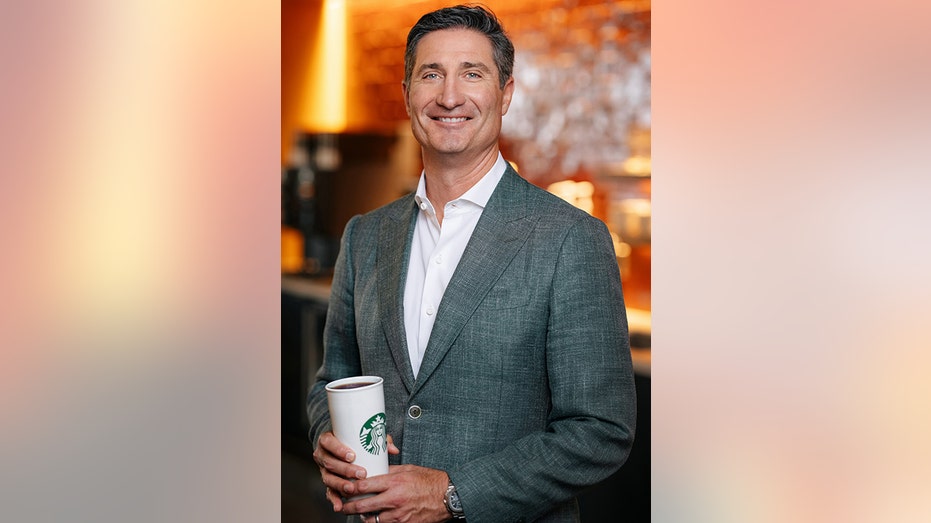Starbucks CEO Brian Niccol, just about four months on the job, has taken on the challenging task of turning around the world renowned coffee giant, using key strategies to drive change and create what he hopes will be the “unrivaled best job in retail.” Chief among them: transparency and swift decision-making.
One of his latest decisions came from an employee email, internally called partners, asking for longer parental leave.
“It caught my attention. I followed up with the team, and then we reached out to a few more partners,” Niccol told FOX Business digital in an exclusive interview. He quickly decided that “this is one we can take action on.”
THE NEW STARBUCKS STRATEGY: WILL CEO BRIAN NICCOL’S PLAN WORK?
Starting this spring, the company will double its paid parental leave benefits. For some workers, it’s as much as three times the original amount.
For instance, paid leave for birth mothers is increasing from six to 18 weeks. All other non-birth parents – whether welcoming a child through birth, surrogacy, adoption or long-term foster care – will receive up to 12 weeks of paid leave at 100% of their average pay, according to Starbucks.
For employees to be eligible for benefits, they need to work an average of 20 hours per week, according to the company’s current policies.
“We have a culture of learning. We have a culture of ideas, but we also want to have a culture of we make decisions, we take action and we hold ourselves accountable on the execution,” Niccol said. “That’s been kind of the deal I’ve been making with people as I go to stores, as I reply to emails, as I do communications, whether it’s letter or video.”

Before Niccol took over, the company faced growing pressure from unionization campaigns across the nation and back-to-back disappointing fiscal quarters as traffic declined. Niccol, who replaced former CEO Laxman Narasimhan in August, is trying to boost profitability and create a better environment for workers.
STARBUCKS’ ‘FALL FROM GRACE’: HOWARD SCHULTZ SAYS COMPANY NEEDS TO FIX US OPERATIONS
In the early days of his new role, Niccol was candid with his team about the need for a “turnaround.”
“I need everybody’s collective best thinking so we have the right insights to turn this business around,” Niccol said.
While he acknowledged he didn’t have all the solutions, he was clear about his commitment: “What I definitely am committed to doing is identifying what we need to fix and taking action to fix it.”
When Niccol, who held executive roles in some of the biggest bands in the industry, including sitting at the helm of Taco Bell and Chipotle, visited stores, he also made it clear to employees that he wanted their input.
He tried to establish ‘Hey, call me, email me, You know, I can’t be in every store, but I’m willing to listen, and I’m willing to listen,'” Niccol said.
One of the first suggestions he received was if the company could bring back the coffee condiment bar. By November, Niccol said the condiment bar is making a comeback next year. He simultaneously announced that stores would boast the former “coffee house” aesthetic with “personal touches,” including serving coffee in ceramic mugs. They are re-introducing Sharpies and will stop charging extra for customizing beverages with non-dairy milk.
“Sometimes when you get into a challenged environment, you kind of become almost store blind, like you don’t see some of these obvious things,” Niccol said. “You’re so focused on trying to get things turned around, you walk past some of the obvious things.”
While Niccol said that not every suggestion would be accepted, he noted the importance of making quick decisions.
He believes the most powerful words for creating a healthy culture are “yes” and “no.”
“If a culture starts to understand where we’re getting the “yeses” and where we are getting the “nos,” it reinforces the kind of business, the kind of values, the kind of promises we want to make for customers and partners,” he said. “I try to keep it simple, and I try to get to a ‘yes’ and a ‘no,’ not let’s have another meeting on that.”
Beyond extending certain benefits, the company is working to improve scheduling and increase the number of hours per employee. The goal is for employees to receive at least 24 hours of work per week, according to Niccol.
Currently, the challenge they are facing is making sure they have enough people scheduled at the right times.
Niccol said that the issue sometimes is that the “roster” of employees gets too small because they try and spread hours evenly, rather than adjusting for the natural ups and downs of the business.
As a result, Niccol said stores end up understaffed during peak times, even though everyone is getting hours. He is trying to ensure that people can rely on their schedules while also making sure the company is scheduling the right number of people at the right times.
Among its latest goals to create a positive work culture, the company also committed to filling 90% of retail leadership roles internally, to ensure employees stay longer and grow with the company.
It is also continuing to cover 100% of college tuition for thousands of employees as part of its Starbucks College Achievement Plan and offering company stock to eligible partners.
Since 1991, 1.5 million partners have received $2.4 billion in stock. Shares have gained 4% this year, trailing the S&P 500’s 27% rise.
